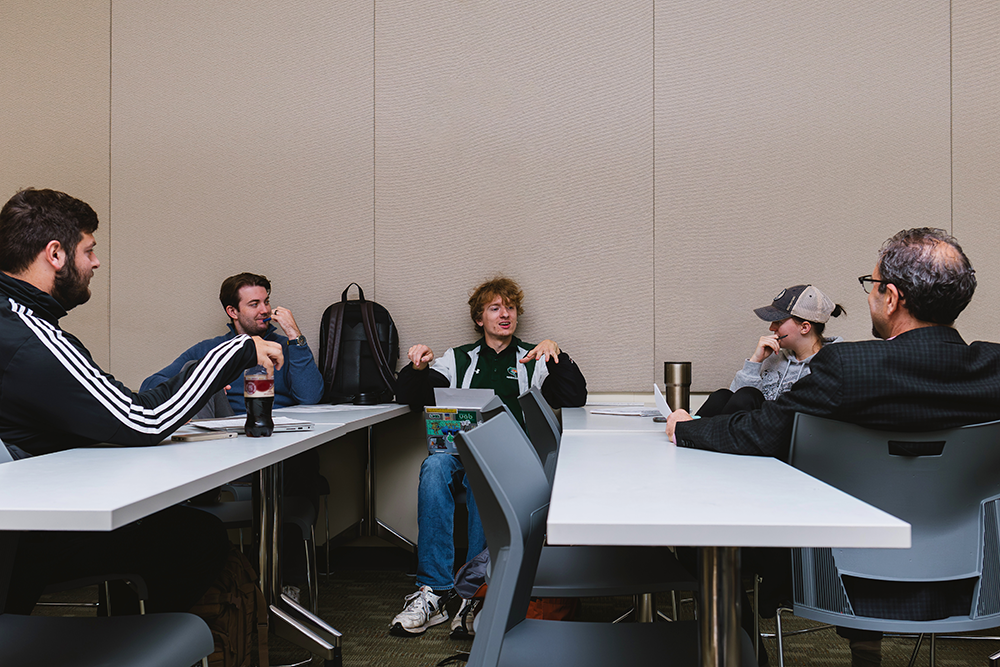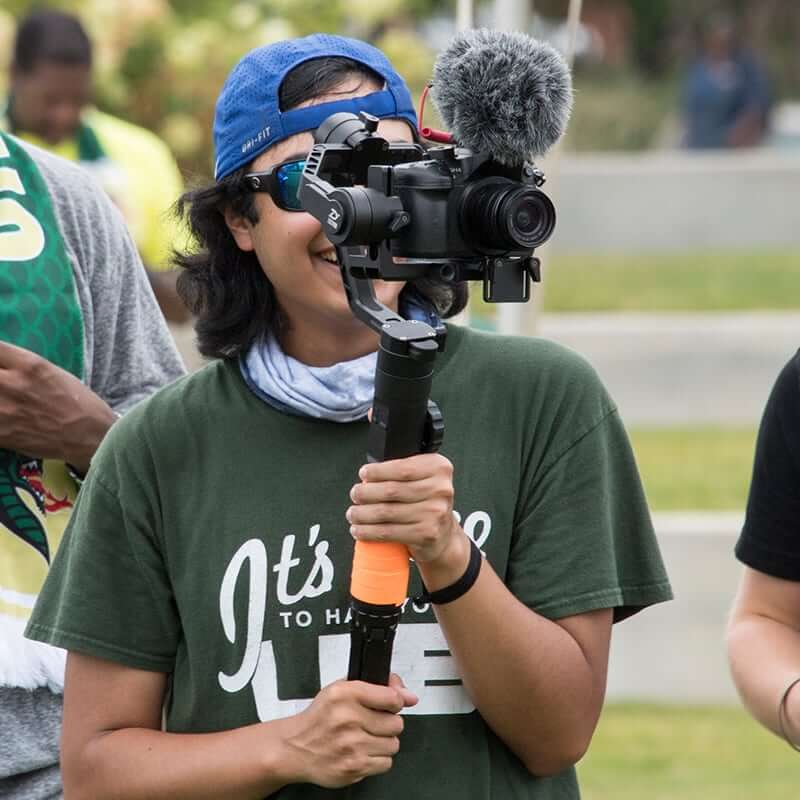Undergraduate
 Students decide to become History majors for many different reasons. Maybe you are curious about the Revolutionary War because of Hamilton. Or maybe you grew up in Alabama and want to know more about the state or Birmingham. Perhaps you saw a TV show about how aliens built the pyramids (they didn’t, btw), or you find gladiators or Nazis fascinating. Or, maybe you just want skills that employers are looking for. In the History Department, we teach all these things and so much more.
Students decide to become History majors for many different reasons. Maybe you are curious about the Revolutionary War because of Hamilton. Or maybe you grew up in Alabama and want to know more about the state or Birmingham. Perhaps you saw a TV show about how aliens built the pyramids (they didn’t, btw), or you find gladiators or Nazis fascinating. Or, maybe you just want skills that employers are looking for. In the History Department, we teach all these things and so much more.
One of the best things about a major in History is that the degree is flexible and can be tailored to your interests. Once you’ve finished two introductory sequences (U.S. history and either World History or Western Civ.), the majority of your classes are going to be courses that you want to take and fit into your schedule. The only other required course is HY 497 (the capstone) which you will take in your senior year.
Program Requirements
All program requirements and courses are outlined in the UAB Undergraduate Catalog. You can also look at a proposed four-year program of study for History majors. You can download the ![]() Undergraduate Program Handbook for a brief synopsis of the program.
Undergraduate Program Handbook for a brief synopsis of the program.
Ready to Apply?
All the information you need to apply can be found on UAB's Undergraduate Admissions site.
 The History Honors Program is designed for outstanding history majors at UAB. It helps prepare you for graduate work in the field or post-graduate studies in areas such as law, theology, and medicine. If accepted, you will have access to advanced classes, enjoy one-on-one interaction with faculty, and will write an honor’s thesis based on original research. Faculty-led independent research for the senior thesis provides you with experience in applying historical methods and analytical writing techniques.
The History Honors Program is designed for outstanding history majors at UAB. It helps prepare you for graduate work in the field or post-graduate studies in areas such as law, theology, and medicine. If accepted, you will have access to advanced classes, enjoy one-on-one interaction with faculty, and will write an honor’s thesis based on original research. Faculty-led independent research for the senior thesis provides you with experience in applying historical methods and analytical writing techniques.
Members of the program are invited to join Phi Alpha Theta, the national history honors organization. Members of UAB's Chi Omicron chapter of Phi Alpha Theta publish the Vulcan Historical Review annually.
Eligibility
You must complete at least 60 semester hours while at UAB, with a minimum 3.0 overall GPA and a minimum 3.5 GPA in history courses. You must complete at least 24 hours in the history major before you can be accepted into the program.
Interested students must apply for the program. Before you apply you will need to find a History Department faculty member who will direct your honors thesis. They can help you with the application process, and they will need to sign your ![]() honors application form. If you are accepted into the program, you and your thesis director will choose two additional faculty members to make up your thesis committee. This committee will determine whether your completed thesis qualifies for honors.
honors application form. If you are accepted into the program, you and your thesis director will choose two additional faculty members to make up your thesis committee. This committee will determine whether your completed thesis qualifies for honors.
Requirements
A complete list of honors requirements and courses are available in the UAB Undergraduate Catalog.
Contact
For additional information on the History Honors Program, contact the Department of History at
Whether you are planning a future in education, law, museum curation, business, healthcare, publishing, or politics, we have the program and tools to help you get where you want to go. Along the way, you will discover what our students tell us time and again: history is fun. The history major offers an endless array of fascinating topics—and dynamic classroom teaching—that will bring the past to life.
We invite you to learn about the many offerings for History majors. For example, we give you the opportunity to work closely with faculty in small classes, publish your work in a journal, join the History honors society, and get course credit for an internship at many excellent sites around Birmingham.
What Can You Do with a History Degree?
History teaches the research, writing, and persuasive arguing skills that are so essential to every professional field. Some of our former students are curators of historical sites, such as Sloss Furnaces or Rickwood Field (the oldest baseball park in the country). Others are archivists, IT experts, military officers, directors of schools and banks around the world, and non-profit professionals.
We're Here for You
We are a hands-on department, made up of professors and instructors who are committed to teaching in many different styles—from lectures, to small discussion groups, to historical reenactments. At UAB, our goal is to make sure you have access to academic and student experiences that will launch you toward a lifelong love of history and into a rewarding career.
Spring 2025 Special Topics Courses
-
HY 201-1C: History & Culture of Gaming
Instructor: Dr. Tola Rodrick
Games are more than just fun - they're windows into the past. This course takes you on a tour of games across history, from ancient Egypt and Rome to medieval China and Mesoamerica, all the way to Dungeons & Dragons and contemporary video games like Minecraft and Assassin's Creed.
We'll explore how games shaped-and were shaped by-culture, politics, religion, and identity. Along the way, we'll tackle big questions: What do games reveal about gender, race, and power? Why are gods and monsters so common in play? How do games shape the way we think about history?
If you're ready to see games as cultural artifacts, challenge your critical thinking skills and rethink what play really means, this course is for you.
-
HY 393 & 459-2E: Spain & The Spanish Inquisition
Instructor: Dr. Andrew Keitt
This course explores Spain's fraught history with the Other, both within and without. Spain’s rise as a confessional state on the Iberian Peninsula and as a global empire in the New World resulted in unquestionable suffering for the exiled and the conquered, but it also generated an unprecedented body of legal theorizing by theologians like Francisco de Vitoria, who questioned the legitimacy of the Spanish conquest. Unlike previous (and many subsequent) imperial propagandists and apologists, these Spanish scholars subjected their own society to a clear-eyed, critical analysis and in so doing laid the groundwork for modern international law.
During the first half of the semester, we will be exploring these contrasts between philosophical speculation and the brutal realities of colonization by playing a Reacting to the Past game. Reacting to the Past consists of elaborate games, set in the past, in which students are assigned roles informed by classic texts in the history of ideas. In RTTP, teams pursue a series of "victory objectives" which are attained by persuading fellow students via written work and oral presentations. This game pits defenders of the indigenous peoples of the New World against conquistadors eager to secure their territorial claims and crown officials and churchmen struggling to administer a far-flung empire.
During the second half of the semester, we will play a Reacting game dealing with a starkly contrasting episode in the history of Spain: the collapse of the Second Republic which set the stage for the rise of the Franco dictatorship. In this episode, far from being a global empire, Spain was an impoverished state collapsing in on itself. In May 1931, King Alfonso XIII fled Spain, and the Second Spanish Republic was declared. The game begins when the temporary Constituent Cortes meets to write a new, republican constitution. The game models the deliberations of the Spanish legislature as elected officials representing parties from across the political spectrum debate the direction of the new Spanish government. Topics include the role of the Catholic Church in society, national minorities, land reform, and the permissibility of political violence. Players will explore the ideologies and tactics of the several factions in the Republic including Socialists, Catholics, Liberals, Communists, and Fascists.



